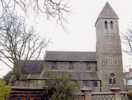 Radcliffe on Trent Radcliffe on Trent
St Mary
Stonework
The stonework of the rebuilt chancel is recorded in the Nottingham Journal
of 18 June 1858. Externally the ‘walling stone is from Bulwell, left
rough upon the face like rock-work, and the effect has been vastly improved
by the insertion of bluestone bands running round the building and over the
arches of all the openings’. The quinquennial report of 1955 noted that
recent repairs at the east end revealed that the fabric ‘has no properly
constructed foundation’.
The report of 1955 records the walling of the nave as formed of ‘square
tooled faced ashlar’, and suggests that stone from the old church could
have been used, redressed with horizontal bands of sandstone. All piers, arches,
responds, string courses, window sills and arches and clerestory windows are
formed in dressed Weldon or Ancaster stone. (Re-building records indicate that
Goddard and Paget recommended Ancaster stone, but Corsham stone was used for
at least some of the work.) The construction of the north and south aisles,
and the baptistry (now known as the tower room) forming the base of the tower,
is similar to the nave.
|